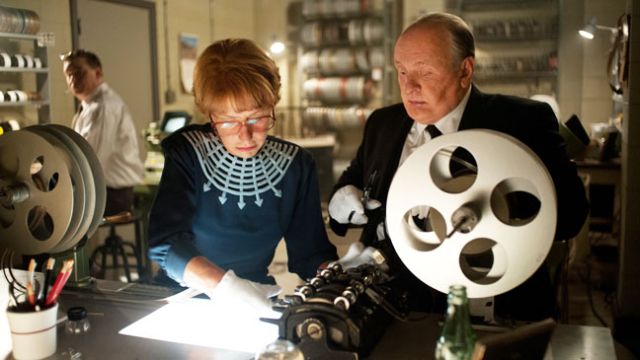A pedestrian talent hitches a ride on genius in Hitchcock, director Sacha Gervasi's often cringemakingly banal look at the filmmaker in the run-up to the mother of all horror movies, Psycho. One can only imagine what the Great Man himself would think of a film that applies rudimentary psychology to a celluloid classic that gets under the skin to an extent Gervasi can only dream of. Thank heavens, at least, for the committed performances of a cast headed by Anthony Hopkins and Helen Mirren as Mr and Mrs H, two classy talents in a film that otherwise feels as if it was made for some sort of biopic competition - and came in a distinct second or third.
UK filmgoers may come to much the same conclusion in any case, given this film's belated release following the TV airing over the festive season of The Girl, which tracked Hitch's relationship with the ne plus ultra of his blondes, The Birds star Tippi Hedren. Hitchcock rewinds the tape several years to focus on the fraught route to notoriety, not to mention iconic status, charted by Psycho, the thriller no one wanted to make, from the censor and Paramount Pictures onwards, The film about the film has a happy ending, which is more than one can vouchsafe about Norman Bates himself, and the less said about John J. McLaughlin's script the better. Sample line: Alma Reville Hitchcock (Mirren) to her portly auteur-hubby (Hopkins), "You know, darling, this could be the biggest success of our career." No, really? (The two leads are pictured below.)
 Hitchcock operates throughout at roughly that level of enquiry, the characters forever spouting assertions that one can't imagine coming from any sensible person, much less these maverick artists. ("We invented new ways of making pictures," Hitchcock early on tells the wife whom he will drive to near-adulterous distraction in the course of a too-brief, thematically underdeveloped narrative.) I suppose it's interesting to glimpse the power behind the throne, so to speak - to discover, for instance, that Alma was the one who suggested Anthony Perkins to play Norman, the guilt-wracked actor here embodied by a shyly self-doubting James D'Arcy.
Hitchcock operates throughout at roughly that level of enquiry, the characters forever spouting assertions that one can't imagine coming from any sensible person, much less these maverick artists. ("We invented new ways of making pictures," Hitchcock early on tells the wife whom he will drive to near-adulterous distraction in the course of a too-brief, thematically underdeveloped narrative.) I suppose it's interesting to glimpse the power behind the throne, so to speak - to discover, for instance, that Alma was the one who suggested Anthony Perkins to play Norman, the guilt-wracked actor here embodied by a shyly self-doubting James D'Arcy.
But all one really comes away with are variations on the platitudes in which this movie has no shame trafficking: behind every great man lies an equally great, if unrecognised, woman. Try telling that to Dame Helen as she once again prepares to play the Queen, this time on stage.
 Hitchcock contains some amusing moments, to be sure. There's genuine drollery that comes from watching the master manipulator of emotions conducting an audience's screams from outside a packed cinema, like some mad conductor damnably separated from his orchestra. And if this scenario is to be believed, no one played the voyeur more than the filmmaker himself, a sad-eyed fantasist whose ongoing fetish for blondes came close to costing him his marriage, until common sense prevailed and he was back in thrall to a woman seen embarking upon her own quasi-dalliance with a libidinous screenwriter called Whitfield Cook (Danny Huston).
Hitchcock contains some amusing moments, to be sure. There's genuine drollery that comes from watching the master manipulator of emotions conducting an audience's screams from outside a packed cinema, like some mad conductor damnably separated from his orchestra. And if this scenario is to be believed, no one played the voyeur more than the filmmaker himself, a sad-eyed fantasist whose ongoing fetish for blondes came close to costing him his marriage, until common sense prevailed and he was back in thrall to a woman seen embarking upon her own quasi-dalliance with a libidinous screenwriter called Whitfield Cook (Danny Huston).
We get glimpses of Ed Gein (Michael Wincott), the real-life serial killer who prompted the 1959 novel on which Psycho was based, while the scenes in which Hitch stares down the anti-artistic impulses of his studio superiors are pro forma in the extreme. Psycho itself barely gets a look-in, beyond a cursory discussion of what went on to become the era-defining Bernard Herrmann score and a partial recreation of the shower scene that allows Scarlett Johansson (pictured above), here cast as Janet Leigh, to exercise the lungs that she is currently pressing into action on the Broadway stage in Cat on a Hot Tin Roof.
A padded Hopkins brings traces of Hannibal Lecter's defining purr to his portrait of a sometimes-wayward husband who needs to be kept in spousal check, and Mirren cuts an exceptionally gracious presence as a wife who has perfected the art of patience. As she would need to have done to put up with Hitchcock.
Watch the trailer for Hitchcock















Add comment